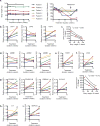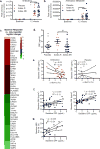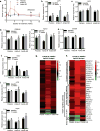Inhibition of IKKɛ and TBK1 Improves Glucose Control in a Subset of Patients with Type 2 Diabetes
- PMID: 28683283
- PMCID: PMC5663294
- DOI: 10.1016/j.cmet.2017.06.006
Inhibition of IKKɛ and TBK1 Improves Glucose Control in a Subset of Patients with Type 2 Diabetes
Abstract
Numerous studies indicate an inflammatory link between obesity and type 2 diabetes. The inflammatory kinases IKKɛ and TBK1 are elevated in obesity; their inhibition in obese mice reduces weight, insulin resistance, fatty liver and inflammation. Here we studied amlexanox, an inhibitor of IKKɛ and TBK1, in a proof-of-concept randomized, double-blind, placebo-controlled study of 42 obese patients with type 2 diabetes and nonalcoholic fatty liver disease. Treatment of patients with amlexanox produced a statistically significant reduction in Hemoglobin A1c and fructosamine. Interestingly, a subset of drug responders also exhibited improvements in insulin sensitivity and hepatic steatosis. This subgroup was characterized by a distinct inflammatory gene expression signature from biopsied subcutaneous fat at baseline. They also exhibited a unique pattern of gene expression changes in response to amlexanox, consistent with increased energy expenditure. Together, these data suggest that dual-specificity inhibitors of IKKɛ and TBK1 may be effective therapies for metabolic disease in an identifiable subset of patients.
Keywords: amlexanox; clinical trial; energy expenditure; fatty liver; gene expression; inflammation; obesity; protein kinase.
Copyright © 2017 Elsevier Inc. All rights reserved.
Figures





References
-
- American Diabetes, A. Bantle JP, Wylie-Rosett J, Albright AL, Apovian CM, Clark NG, Franz MJ, Hoogwerf BJ, Lichtenstein AH, Mayer-Davis E, et al. Nutrition recommendations and interventions for diabetes: a position statement of the American Diabetes Association. Diabetes Care. 2008;31(Suppl 1):S61–78. - PubMed
-
- Arkan MC, Hevener AL, Greten FR, Maeda S, Li ZW, Long JM, Wynshaw-Boris A, Poli G, Olefsky J, Karin M. IKK-beta links inflammation to obesity-induced insulin resistance. Nat Med. 2005;11:191–198. - PubMed
-
- Arner P. Catecholamine-induced lipolysis in obesity. Int J Obes Relat Metab Disord. 1999;23(Suppl 1):10–13. - PubMed
Publication types
MeSH terms
Substances
Grants and funding
- K01 DK113065/DK/NIDDK NIH HHS/United States
- R01 HL105278/HL/NHLBI NIH HHS/United States
- R24 DK090962/DK/NIDDK NIH HHS/United States
- P30 DK089503/DK/NIDDK NIH HHS/United States
- P30 DK063491/DK/NIDDK NIH HHS/United States
- R37 DK057978/DK/NIDDK NIH HHS/United States
- UL1 TR002240/TR/NCATS NIH HHS/United States
- P30 DK020572/DK/NIDDK NIH HHS/United States
- UL1 TR000433/TR/NCATS NIH HHS/United States
- P01 HL088093/HL/NHLBI NIH HHS/United States
- R01 DK076906/DK/NIDDK NIH HHS/United States
- R01 DK100319/DK/NIDDK NIH HHS/United States
- R21 DK098776/DK/NIDDK NIH HHS/United States
- K01 DK105075/DK/NIDDK NIH HHS/United States
- P30 DK034933/DK/NIDDK NIH HHS/United States
- R01 DK060591/DK/NIDDK NIH HHS/United States
- R01 DK057978/DK/NIDDK NIH HHS/United States
LinkOut - more resources
Full Text Sources
Other Literature Sources
Medical
Miscellaneous

